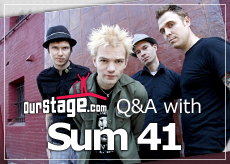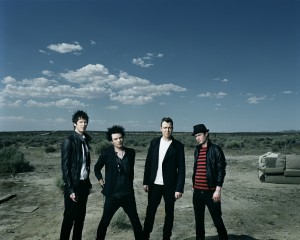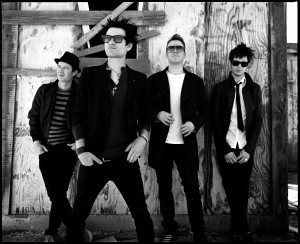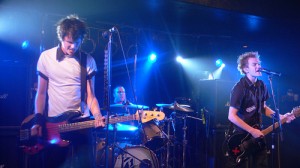Q&A With Sum 41
posted in: Exclusive Interviews • Features • Rock
 Chances are, it’s been a few years since Sum 41 popped up on your radar. The four piece haven’t released a full-length since 2007, and few albums since 2001’s runaway success All Killer No Filler have managed to spawn catchy, radio-friendly rock hits like “In Too Deep” and “Fat Lip.” Or maybe you have been hearing Sum 41 and you just didn’t realize it”the once bratty pop punks have consistently developed a heavier and more mature sound that doesn’t sound much like their earlier work.
Chances are, it’s been a few years since Sum 41 popped up on your radar. The four piece haven’t released a full-length since 2007, and few albums since 2001’s runaway success All Killer No Filler have managed to spawn catchy, radio-friendly rock hits like “In Too Deep” and “Fat Lip.” Or maybe you have been hearing Sum 41 and you just didn’t realize it”the once bratty pop punks have consistently developed a heavier and more mature sound that doesn’t sound much like their earlier work.
Either way, the Canadian rockers are back in action this spring. They have a new album, Screaming Bloody Murder, and a new outlook on what’s important to them. OurStage caught up with bassist Jason Cone McCaslin to talk about the evolution of the band, the struggles of putting together the new album and how Sum 41 doesn’t count on radio for their success.
OS: First, to clear up a mystery: why does everyone call you Cone?
CM: Umm, I mean it’s just one of those nicknames that I got in high school when I was fifteen or sixteen, something like that. It’s actually kind of a really stupid story, but I used to eat a lot of ice cream all the time. And so Deryck and all those guys”before I was even in Sum 41” they just started calling me Cone. And so when I joined Sum 41, they just kept on calling me Cone. Just one of those stupid high school things, really.
OS: Screaming Bloody Murder was originally supposed to be released in 2009, and you  were only planning to release a few songs on an EP. What happened to change that?
were only planning to release a few songs on an EP. What happened to change that?
CM: I guess the original idea was, Deryck had four or five songs written so I’d fly down to LA and we’d just kind of do these four or five songs that he had. We started talking about, You know, maybe we should release an EP. And then once they were recorded”and we kind of almost did fully record the EP except for mixing, really”we just decided that we liked the songs a lot. We started thinking about how EPs don’t really… they kind of go unnoticed. It’s just kind of a waste of time to do as an EP. So we decided that we really liked the songs and we didn’t want the songs to go unnoticed, and Deryck was writing a lot. It was like, You know what? Let’s just wait and as you write some songs we’ll all fly down to LA and just record them as you have them. That’s basically it.
OS: You guys had to pay for some of the cost of this album out of pocket”how did it get to that point?
CM: I guess we went over budget. I’m not really sure. We recorded the album, and then once it was kind of done we listened to it and we all decided we didn’t feel like it was complete. There was something missing about it. And Deryck was still writing songs, he was kind of writing songs all through the process of recording. He had these two songs, which are Time for You to Go and Maybe You Don’t Want to Know, and he said, Yeah, I’ve got these two new songs. I think this could be the piece of the album that we’re missing. So we went to the label and said, We’ve got two more songs we want to record. And to them, we were kind of done. They gave us all the money to record, and to them the album was done. So when we said there was two more songs we wanted to record, they said, No. We’re not gonna pay for this. And we just liked the two songs a lot, and we wanted them on the album, so we just said, Okay fuck it. We’ll just pay for it then.
OS: Deryck has given a few interviews regarding the new album where he seems to have a very fuck what everyone thinks attitude about whether or not people like the material. Do you feel the same way?
 CM: No, I don’t know if it’s… we’ve talked about this many times, and when we talk about it as a band it’s not like we’re all, Fuck everyone, we hate everyone. We’re not bitter and jaded, we just feel like we have a real connection with our fans and we have a really strong fan base. So basically by saying that, we’re not really saying Fuck you, fuck you. We’re just saying if radio doesn’t play it, or if video channels don’t pick up our video, then it’s not the end of the world to us. Where ten years ago it was like, we were always told we had to be on the radio. Now it’s like yeah, it would be cool. We’d love to be on the radio. If our song gets played on the radio, we’re happy. We’re excited. But if it doesn’t happen we’re not pissed off and bummed out. We’re just like, Okay, well fuck it. We have a strong fan base, and people are still coming to our shows. We have a lot of fans around the world, and we still tour around the world playing really good shows…
CM: No, I don’t know if it’s… we’ve talked about this many times, and when we talk about it as a band it’s not like we’re all, Fuck everyone, we hate everyone. We’re not bitter and jaded, we just feel like we have a real connection with our fans and we have a really strong fan base. So basically by saying that, we’re not really saying Fuck you, fuck you. We’re just saying if radio doesn’t play it, or if video channels don’t pick up our video, then it’s not the end of the world to us. Where ten years ago it was like, we were always told we had to be on the radio. Now it’s like yeah, it would be cool. We’d love to be on the radio. If our song gets played on the radio, we’re happy. We’re excited. But if it doesn’t happen we’re not pissed off and bummed out. We’re just like, Okay, well fuck it. We have a strong fan base, and people are still coming to our shows. We have a lot of fans around the world, and we still tour around the world playing really good shows…
OS: You mentioned how strong your fan base is, but have you found you attract a different type of fan as you guys move away from pop-punk and into heaver, more mature material? Or are your fans maturing with you?
CM: It’s funny, that’s kind of a good question. It’s hard to tell, but if you went to one of our shows… I guess the easiest way to do it is if you’re looking out where I’m playing, I see people that are thirty to thirty-five years old that have probably listened to us since Half Hour of Power. And then I see these fourteen-year-old kids that obviously have somehow found out about us through whatever it is”YouTube, or their older brother, or whatever. It’s really hard to say. I just think with stuff like YouTube and online stuff, I think kids find out about your band anyway. Like I said, you don’t have to be on the radio, you don’t have to have a video on TV. A twelve-year-old who’s just getting into rock music can go online and find out about you. I think that’s what’s happening with us and younger kids. Because we’re not necessarily plastered all over the radio right now, but we still have more people come to our shows. I don’t even know how to explain that. The only way I can explain it is just that they’re finding out about it somehow.
OS: Chuck was heavily influenced by your time in the Congo”does that experience influence your work still, or have you moved on from it since then?
CM: You know, I still think about the Congo. It’s one of those things that happened in our lives that will never really truly go away, because I mean, we did almost die. When you have a near death experience like that it does pop into your head once in a while. We still do stuff with War Child, the only thing is coming home from that made us like, not want to go to war-affected countries anymore. And it’s too bad, because it would have been nice to. I would still like to do stuff like that ”do documentaries. But I just don’t think that after having that happen to us that any of us could go to one of those places again. But the experience, hopefully that DVD did something in the way of educating people on what is really happening over there, because it happened to us too. Hopefully it did some good. I still think about it.
OS: So between the earlier punky stuff and the more recent heavy stuff, what do you prefer performing live?
performing live?
CM: I kind of like the harder stuff, the uptempo stuff like Keep You Waiting and Over My Head, or even this new song called Skumfuk is really fun to play live. There’s a song called No Reason off Chuck that’s really fun. That type of up-tempo, high-energy stuff.
OS: You guys were so young when you started this band” when you were kids, did you see yourselves doing this ten, fifteen years later?
CM: When we were really young and we started the band… the band was started in 1996, but we really started focusing around 1998 when we were like, Okay, this is it. This is what we’re going to do. And we were really driven as kids at the time. That’s all we did”we’d practice five times a week, we’d play shows on the weekends, we’d play anywhere and everywhere we could. So our whole life as a teenager was wrapped around getting this band to a career and playing music for the rest of our lives. We’re just really lucky that it happened. But if we didn’t get successful, we’d probably all be in bands right now, trying to still do it. We’re just one of the bands that got lucky to be able to do it for the rest of our lives.
Check out Screaming Bloody Murder, available now, and don’t miss Sum 41 on their summer tour.
